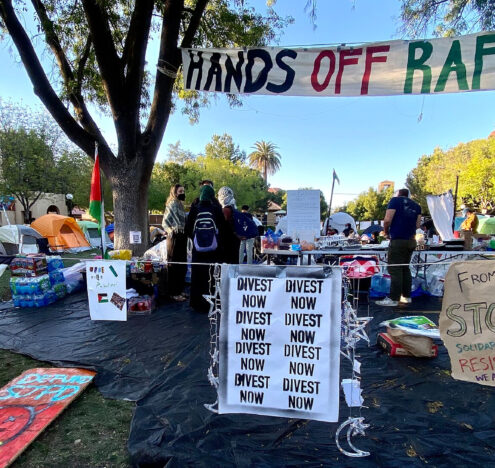President Joe Biden returned from the Middle East with little to show except for a declaration that the use of force against Iran is on the table along with a new arms sale to the regime that just jailed Jamal Khashoggi’s lawyer (and US citizen) on bogus charges. However, in Israel, Biden did speak specifically about the case of slain American Associated Press journalist Shireen Abu Akleh, calling for a “full and transparent accounting” of the events surrounding her death.
Yet, the president’s words rang hollow as his actions throughout the rest of his visit affirmed that it was unlikely that there would be any meaningful accountability for Abu Akleh’s killing — just as Biden’s fist bump with Mohammed bin Salman confirmed there would be no reckoning for Khashoggi’s assassination in 2018, a Washington Post journalist who was known for being critical of Saudi Arabia.
As with Khashoggi’s murder, if the president won’t act to create accountability, Congress must step in and demand answers.
THE FLURRY OF ACTIVITY IN CONGRESS
At issue is the killing of Abu Akleh, a Palestinian-American journalist with the Associated Press, who was killed after arriving to document an Israeli military raid in the West Bank. By all accounts, except the Israeli military’s, which has still not released its final findings, it was the Israeli Defense Forces (IDF) who fatally shot Abu Akleh. Open source investigations by the Washington Post and the New York Times, as well as by the UN High Commissioner for Human Rights and the Palestinian Authority, clearly blame Israeli forces. Even the Biden administration has acknowledged — although somewhat begrudgingly — that the bullet came from the direction of the IDF in a summary report from the US Security Coordinator for Israel and Palestine.
Moreover, CNN found evidence that Israeli forces may have intentionally targeted the Associated Press team. After all, they had made themselves known to IDF soldiers in the area and were wearing clearly marked press flak jackets. And the IDF saw them, as this worrisome quote from Israeli military spokesperson Ran Kochav indicates, where he said that Abu Akleh and her team were “…armed with cameras, if you’ll permit me to say so.”
Abu Akleh’s killing and the deaths of other journalists are the predictable outcome of Israel’s brutal occupation and apartheid system that US taxpayer dollars fund by the billions each year.
Though the Biden administration condemned the killing, it has been slow to do more, careful to not get ahead of the Israeli government. Meanwhile, there has been a flurry of congressional activity, even animating more moderate Democrats and some Republicans to call for an independent, US-led investigation. From asking the FBI and State Department to open an independent probe and urging the president to ensure that the US government opens its own investigation to trying to attach an amendment requiring an inquiry to this year’s National Defense Authorization Act, both chambers have kept up the pressure for answers.
Senators followed up again after the US State Department released the summary of the US Security Coordinator for Israel and Palestine investigation, which determined that Abu Akleh was “likely” killed, unintentionally by IDF forces. Senators, however, concluded that the report “hardly constitutes an independent investigation into the overall circumstances of her killing.” This continued pressure likely helped elicit Biden’s comment in Jerusalem last week. However, despite his promise that the United States “will continue to stand up for media freedom everywhere in the world,” it remains unclear what specific actions his administration will take moving forward.
The president’s language might indicate what to expect: Biden said the United States “will continue to insist on a full and transparent accounting of her death… .” But “insist” suggests that the US government is more likely to remain an observer rather than a primary investigator. This is typical of the US government, which does not normally investigate the deaths of Americans abroad. But Aku Akleh’s killing is not a typical case, and the failure to take any meaningful steps toward justice would be a green light for further impunity to target journalists.
Like Congress, Abu Akleh’s family is calling for the US government to do more, including opening an FBI investigation into her killing. Her niece aptly noted that while such a step was necessary, it was not sufficient without considering the systems of military occupation and apartheid that created the conditions for her aunt’s killing in the first place. At least 30 journalists have been killed in the Occupied Territories since 2000 and no one has been held accountable. Many “investigations” have ended in similar non-denial denials being offered by the Israeli military today: It’s unclear who it was, but if it was an IDF soldier, it was an accident.
If the US government accepts this problematic narrative, policymakers risk missing the forest for the trees once again: Abu Akleh’s killing and the deaths of other journalists, NGO workers, and civilians are the predictable outcome of Israel’s brutal occupation and apartheid system that US taxpayer dollars fund by the billions each year.
RHETORIC CAN’T REPLACE ACCOUNTABILITY
Biden’s rhetoric in Israel was welcome, but it will do more harm than good if his administration continues to ignore the United States’ strategic interest in putting its money where Biden’s mouth is: Protecting the freedom of the press and protecting Americans abroad. Attacks on journalists and independent media have skyrocketed over the last decade, and the US government is complicit by failing to create even a semblance of accountability for allied government slayings of journalists, whether for their criticism of state policy or for shining a light on abuses.
Abu Akleh’s killing also allows Congress to go beyond its standard practice of making empty promises with no action. For example, Congress can force executive action by trying to enforce existing human rights obligations under domestic and international law pertaining to the potential misuse of US-sold or provided weapons and defense articles.
Given the amount of security assistance the Israeli military receives from the US government and military contractors each year, there’s a high likelihood that US munitions and/or armaments were used. However, it’s hard for us to say definitively because Israel is the only country in the world where the United States does not have tracking mechanisms to determine how money is spent or where weapons are sold. According to the Carnegie Endowment for International Peace, how the Israeli military spends 99.98% of $3.3 billion in US taxpayer grants every year is “untraceable.” While the lack of transparency in aid to Israel is the most extreme example, it’s part of a clear pattern in US security assistance arrangements with other abusive militaries over decades and within the arms trade in general.
Biden’s failure to hold allies accountable for serious violations of international norms, therefore, feeds an international culture of impunity that makes us all less safe.
Kate Kizer is a senior non-resident fellow for US national security policy at the Center for International Policy and is a columnist at Inkstick.





















